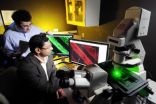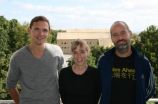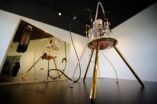(Press-News.org) According to latest research, social scientists with PhDs working in central government make valuable contributions to policy, and report that holding a PhD can enhance their credibility with senior officials. It also shows that they are more likely to have climbed the career ladder and progressed into leadership roles.
The Economic and Social Research Council (ESRC), which provides significant support for postgraduate training (PhD) and other schemes, commissioned the research. It was carried out over an eight-month period from October 2011 and was led by Mariell Juhlin, Policy Impact Ltd, and team members Dr Puay Tang, University of Sussex, and Professor Jordi Molas-Gallart, INGENIO.
The study aimed to identify and evaluate the contribution to policymaking made by social scientists working within the Government Economic Service and Government Social Research Service. In particular, it looked closely at the differences in the contributions of people with PhDs and those without, and also at the factors and processes that could enhance or lessen contributions to decision-making.
Thirteen per cent of the social scientists who took part in the study held PhDs, compared with 66 per cent who held masters degrees and 21 per cent who held Bachelor degrees. Sixty-six per cent of respondents with PhDs were in senior positions, compared with 49 per cent of those with Masters degrees and 19 per cent of those Bachelor degrees.
The contribution to decision-making by social scientists with PhDs was widespread – but not always readily visible in policies. Despite this, the study identified examples of advice and recommendations that have been taken up. For example, a senior social scientist working in the Intellectual Property Office played a leading role in the drafting of the Hargreaves Review, which proposed a system to drive economic growth and innovation that is now being implemented by government. Another social scientist based with a regulator applied and consolidated an innovative solution, resulting in a cost-efficient enforcement outcome for scrutiny of company mergers and acquisitions.
Employers, policy clients and social scientists recognise the value of research methodologies learned in doctoral training and how they help in addressing policy issues. But, employers commented that social scientists require an ability to grasp what is needed, deliver pragmatic solutions, and avoid over-emphasis on fine detail to make a difference in a policy setting.
Although a PhD is not a requirement for recruitment to government economic and social research services, PhD holders have an advantage in some skills that are highly valued by employers, such as project management. There was a condition, however, that employees with PhDs should have softer skills, such as being good communicators and networkers to maximise their policy contributions.
Writing reports and briefing notes was undertaken by all groups of social scientists, but the involvement of those with PhDs was found to be more intense. They also undertook other activities, such as project management, research procurement and advisory roles. Many considered that their formal PhD training helps them with the uptake of new methods, evidence from academia and other organisations' research findings.
Social scientists saw themselves as contributing to policymaking at all stages of the policy cycle. But location does make a difference: people working in policy units were more frequently involved in clarifying objectives and the design and implementation of policy, than those working in analysis units.
When policymakers and social scientists worked alongside each other, this was regarded as an important factor in developing trust and collaboration. It was also thought to provide social scientists with a better awareness of the context of policymaking, and to optimise the relevance and timing of their input.
###
For further information contact:
Margaret Macadam
Email: margaret.macadam@esrc.ac.uk
Telephone 01793 413161
ESRC Press Office:
Jeanine Woolley
Email: jeanine.woolley@esrc.ac.uk
Telephone 01793 413119
Melanie Knetsch
Email: melanie.knetsch@esrc.ac.uk
Telephone 01793 413049
Notes for editors
1. This release is based on the findings from 'Study of the Contribution of Social Scientists to Government Policy and Practice' and was carried out on behalf of the Economic and Social Research Council (ESRC) by Mariell Juhlin, the MD of Policy Impact Ltd, who led the project. She worked with Dr Puay Tang, Senior Lecturer, Science and Technology Policy Research (SPRU), University of Sussex, and Jordi Molas-Gallart, Research Professor at INGENIO, a joint research institute of the Spanish National Council of Scientific Research (CSIC) and the Polytechnic University of Valencia (UPV).
2. The evaluation report can be found at http://www.esrc.ac.uk/impacts-and-findings/impact-assessment/development-studies.aspx
3. The study was undertaken between October 2011 and May 2012. It involved a mixed methods approach for the collection and analysis of data - involving both qualitative and quantitative elements. The project included inception interviews with stakeholders, case studies and an online survey.
4. A 'Context-Mechanisms-Outcomes' framework (from Pawson, R. and N. Tilley (1997): "Realistic Evaluation", London, SAGE Publications) for understanding and assessing the contributions of social scientists in government to public policy was used. This entailed making a distinction between the different 'contexts' in which the social scientist PhDs in the Government Economic Service (GES) and the Government Social Research Service (GSR) operate; the 'mechanisms' through which they can affect or are affecting policy and practice in government; and the 'outcomes' or effects of their involvement in policy and practice. All interview guidelines, online questionnaires and case-study structures were devised incorporating these three categories.
5. In total, 16 interviews were held with stakeholders, including the inception phase and as part of case study preparation; four case studies were prepared, involving social scientists with PhDs and their policy clients. The online survey targeted all GES and GSR members in central government, but excluded those working in Welsh, Scottish and Northern Irish administrations. There were 653 responses to the survey, representing a response rate of approximately 25 per cent. The gender balance in responses was 50.3 per cent males and 49.7 per cent females.
6. The Economic and Social Research Council (ESRC) is the UK's largest organisation for funding research on economic and social issues. It supports independent, high quality research which has an impact on business, the public sector and the third sector. The ESRC's total budget for 2012/13 is £205 million. At any one time the ESRC supports over 4,000 researchers and postgraduate students in academic institutions and independent research institutes. More at www.esrc.ac.uk
Social scientists contribute to policy in central government
2012-10-02
ELSE PRESS RELEASES FROM THIS DATE:
Prehistoric builders reveal trade secrets
2012-10-02
A fossil which has lain in a museum drawer for over a century has been recognized by a University of Leicester geologist as a unique clue to the long-lost skills of some of the most sophisticated animal architects that have ever lived on this planet.
It has provided evidence that early organisms developed specialised roles and that these specialists displayed co-operation in order to construct their homes – much like today's builders employ a team of bricklayers, plasters and decorators.
The fossil is a graptolite, a planktonic colony from nearly half a billion years ...
Egyptian toe tests show they're likely to be the world's oldest prosthetics
2012-10-02
The results of scientific tests using replicas of two ancient Egyptian artificial toes, including one that was found on the foot of a mummy, suggest that they're likely to be the world's first prosthetic body parts.
The University of Manchester researcher Dr Jacky Finch wanted to find out if a three part wood and leather toe dating from between 950 to 710 BC found on a female mummy buried near Luxor in Egypt, and the Greville Chester artificial toe from before 600 BC and made of cartonnage (a sort of papier maché mixture made using linen, glue and plaster), could be ...
The water flow of the Amazon River in a natural climate archive
2012-10-02
Oxygen isotopes in tree rings are an excellent archive of precipitation dynamics in the tropical Amazon region. The precise determination of the ratios of stable oxygen isotopes (18O/16O) proves to be a new parameter for detecting the dynamics of the water cycle in tropical rain forest areas. It can therefore replace the classic climate observables such as tree ring width or wood density, which are unsuitable for high-quality reconstructions of climate conditions in tropical areas. These are the findings of a group of researchers from the GFZ German Research Centre for ...
The Journal of Evidence-Based Dental Practice focuses on periodontal and implant treatments
2012-10-02
St. Louis, MO, October 2, 2012 – What's the latest, research-supported best practice in periodontal care and implant dentistry? Dental specialists and generalists alike can read about it in the first of a new series from The Journal of Evidence-Based Dental Practice (JEBDP), the foremost publication of information about evidence-based dental practice, published by Elsevier.
The inaugural edition of the Annual Report on Periodontal and Implant Treatment is now available, containing concise, authoritative reviews based on the evidence about practice-critical topics. Mark ...
Study suggests immune system can boost regeneration of peripheral nerves
2012-10-02
Modulating immune response to injury could accelerate the regeneration of severed peripheral nerves, a new study in an animal model has found. By altering activity of the macrophage cells that respond to injuries, researchers dramatically increased the rate at which nerve processes regrew.
Influencing the macrophages immediately after injury may affect the whole cascade of biochemical events that occurs after nerve damage, potentially eliminating the need to directly stimulate the growth of axons using nerve growth factors. If the results of this first-ever study can ...
Happiness at work depends on a good salary, but also on how much colleagues earn
2012-10-02
This press release is available in Spanish.
The study, published by Professor Eduardo Pérez Asenjo of UC3M's Economics Department, shows that relative earnings affect our happiness and our job performance. Summing up: if the people with whom I compare myself earn more than I do, I will be unhappier and I will work more. "This confirms the hypothesis of what I perceived, but not the way I would like things to be," the author of the study comments. "I would find it healthier not to compare what we earn to what others earn and I think it would be 'better' if these things ...
Length matters in gene expression
2012-10-02
Gene ends communicate
Human genomes harbour thousands of genes, each of which gives rise to proteins when it is active. But which inherent features of a gene determine its activity? Postdoctoral Scholar Pia Kjølhede Andersen and Senior Researcher Søren Lykke-Andersen from the Danish National Research Foundation's Centre for mRNP Biogenesis and Metabolism have now found that the distance between the gene start, termed the 'promoter', and the gene end, the 'terminator', is crucial for the activity of a protein-coding gene. If the distance is too short, the gene is transcriptionally ...
Intelligence is in the genes, but where?
2012-10-02
You can thank your parents for your smarts—or at least some of them. Psychologists have long known that intelligence, like most other traits, is partly genetic. But a new study led by psychological scientist Christopher Chabris reveals the surprising fact that most of the specific genes long thought to be linked to intelligence probably have no bearing on one's IQ. And it may be some time before researchers can identify intelligence's specific genetic roots.
Chabris and David Laibson, a Harvard economist, led an international team of researchers that analyzed a dozen ...
Superman-strength bacteria produce gold
2012-10-02
EAST LANSING, Mich. — At a time when the value of gold has reached an all-time high, Michigan State University researchers have discovered a bacterium's ability to withstand incredible amounts of toxicity is key to creating 24-karat gold.
"Microbial alchemy is what we're doing – transforming gold from something that has no value into a solid, precious metal that's valuable," said Kazem Kashefi, assistant professor of microbiology and molecular genetics.
He and Adam Brown, associate professor of electronic art and intermedia, found the metal-tolerant bacteria Cupriavidus ...
Solar cell consisting of a single molecule
2012-10-02
This press release is available in German.
A team of scientists, led by Joachim Reichert, Johannes Barth, and Alexander Holleitner (Technische Universitaet Muenchen, Clusters of Excellence MAP and NIM), and Itai Carmeli (Tel Aviv University) developed a method to measure photocurrents of a single functionalized photosynthetic protein system. The scientists could demonstrate that such a system can be integrated and selectively addressed in artificial photovoltaic device architectures while retaining their biomolecular functional properties. The proteins represent light-driven, ...





